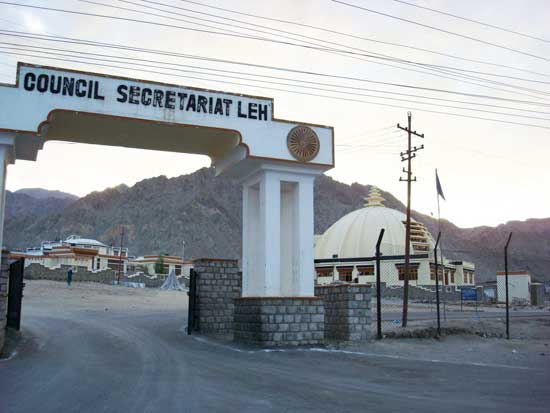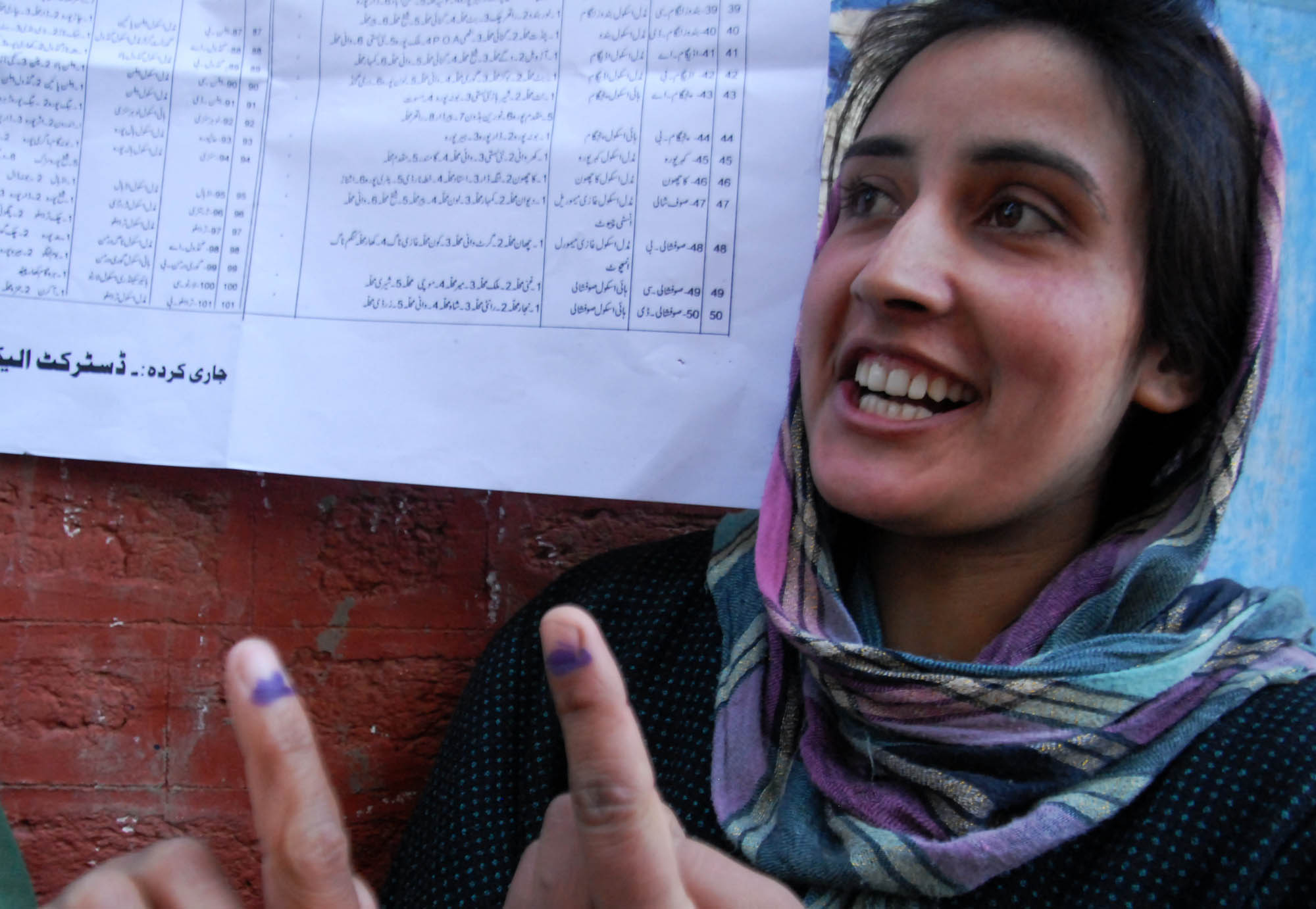
The LUTF faced a rout after in Hill Council elections, and Congress romped home with a thumping majority as NC stayed out. Ilham Hassan reports.
Anti-incumbency factor and poll-time merger with the Bhartiya Janata Party (BJP) spelled doom for the Ladakh Union Territory Front (LUTF) in the fourth general elections for the Ladakh Autonomous Hill Development Council (LAHDC) Leh. The Congress emerged triumphant without much resistance. Apart from relentless efforts from the Congress leaders including Tourism Minister Nawang Rigzin Jora, the absence of traditional regional parties like the National Conference played pivotal in the thumping Congress win.
Last month, Principal District and Sessions Judge Leh Aijaz Ahmad Mir administered oath of office to newly-elected Chief Executive Councilor Rigzin Spalbar, who got the post for second time. Spalbar won two council seats, one of them uncontested. He was the natural choice for the Congress councilors to be elected as leader of the house.
The Hill Council elections were held on October 16 for 24 seats. Two seats -Temisgam and Suko-Markha – had already gone into Congress’ kitty unopposed. Congress bagged 19 seats while its rival BJP managed just four seats. An independent candidate cruised through from Ticksay constituency. The People’s Democratic Party failed to make a mark while the National Conference chose to stay away, due to coalition compulsions and reluctance of its leadership to reestablish the party in the region.
Major upset of the election was the defeat of former Chief Executive Councilor, Chering Dorje from Phyang constituency. Dorje, one of the most credible politicians of Ladakh, lost to Congress candidate Tsering Sonam by a margin of 1039 votes. Insiders say that Dorje was not happy with LUTF’s decision to merge with the BJP but the decision was imposed on him by a section of party leadership.
Soon after the declaration of results, the state government recalled Deputy Commissioner T Angchuk to resume duty after an enforced sabbatical. Angchuk was removed from the district, at the peak of election campaign, when BJP leader Prof Chaman Lal Gupta, in the state assembly, accused of him of working at the behest of Congress leaders. The deputy commissioner functions as pivotal Chief Executive Officer in the Hill Council.
 The newly-elected CEC Rigzin Spalbar is a known strategist who was instrumental in demolishing LUTF’s fortress. With 21 members in the Council, Spalbar has emerged as the strongest ever CEC. Sources said that he imposed his authority by handpicking executive councilors, without succumbing to lobbying by a section of party leaders. He described his selection of executive councilors as a result of his “own perspective” and consultation with senior most leaders of the party. Advocate Sonam Dorjay, who won uncontested from Temisgam; Dr. Sonam Wangchuk winner from Hunder constituency and Ghulam Abbas Abidi, a representative from Muslim community were taken as executive councilors.
The newly-elected CEC Rigzin Spalbar is a known strategist who was instrumental in demolishing LUTF’s fortress. With 21 members in the Council, Spalbar has emerged as the strongest ever CEC. Sources said that he imposed his authority by handpicking executive councilors, without succumbing to lobbying by a section of party leaders. He described his selection of executive councilors as a result of his “own perspective” and consultation with senior most leaders of the party. Advocate Sonam Dorjay, who won uncontested from Temisgam; Dr. Sonam Wangchuk winner from Hunder constituency and Ghulam Abbas Abidi, a representative from Muslim community were taken as executive councilors.
Former executive councilor Chewang Rigzin, who revolted in Ladakh Union Territory Front (LUTF) to join the Congress, did not get a berth among Spalbar’s executives. Rigzin was banking on the fact that his rebellion in the LUTF triggered chinks in the party that culminated into its complete rout.
The erstwhile LUTF is shell-shocked over the humiliating defeat. Observers say that LUTF’s poll-time merger with the BJP was one of the main reasons for its defeat. “BJP is a known communal party, which has the Hindutva agenda. How could the people of Ladakh afford to vote for a communal party,” former union minister P Namgial told Kashmir Life.
The majority of the Leh population comprises Buddhists. Muslims also comprise a significant portion of the population and some pockets are strong Muslim belts. The Muslim vote-bank impacts the result in several constituencies.
Sources said that founder CEC of the LAHDC Thupstan Chewang, who later became MP from Ladakh was instrumental in merging LUTF into BJP. He is the architect of the Union Territory thought, which gained currency after the 1989 anti-Kashmir campaign in Leh. Sources said that Thupstan attempted to get closer to the Congress in 2004 but his plans were scuttled by influential Congress leaders in Leh. He and Rigzin Jora are known rivals.
The LUTF also sought to associate with the ruling National Conference but the NC leadership showed cold-shoulder. During 2008 assembly elections and subsequent parliamentary elections, the LUTF covertly supported the NC but the ruling party refused to reciprocate, primarily due to coalition compulsions. “During the elections, the Omar Abdullah government was on a sticky wicket due to anti-India protests in Kashmir Valley. The NC could have ill-afforded to forge an alliance with Congress rivals in any part of the state,” said Ladakh Affairs expert Bashir Ahmad.
Sources said that the LUTF leaders may review their decision to merge with the BJP. “They (LUTF leaders) may end their association with the BJP as it has not helped them at all,” Ahmad said.
But, on the ground, the Congress lent a body-blow to the BJP and would scuttle its plans to resurrect. A senior Congress leader told Kashmir Life that BJP has plans to convert Buddhists as “they did in Lahaul-Spiti in Himachal Pradesh”.
“Despite BJP’s wholesale distribution of money to buy voters, the majority of the electorate frustrated their designs and voted for the secular Congress party to ensure equitable and speedy development of the hilly region,” Spalbar said.
Interestingly, Congress has brought in another strategist T Samphel to head the District Congress Committee after he completed his stint as member of the National Minority Commission. The party has celebrated the Leh win at a grand scale. The arrival of P Chidambaram in the town to interact with the newly-elected councilors was not altogether misplaced.















